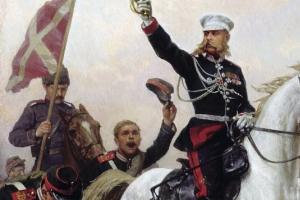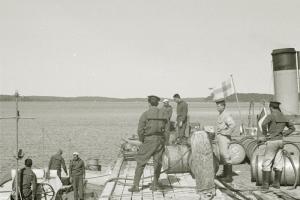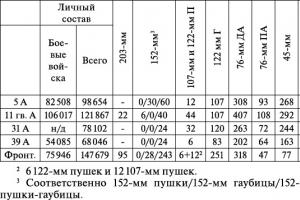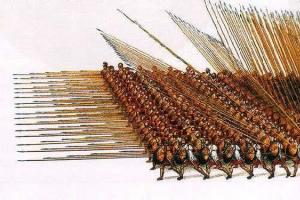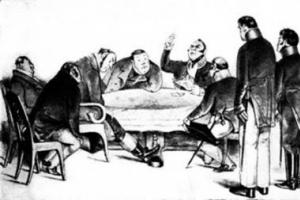surpassed him in strength and skills.
During the war with Troy, Ajax's army lands on the Trojan coast along with Achilles' detachment. His twelve ships conquer the coast, and the territory surrenders to the first wave of Achaeans.
Ajax was of enormous height (at that time two meters tall was considered gigantic), formidable, powerful, always armed with a full-length seven-skinned shield covered with copper plates. After the war, the vanquished describe Ajax as being like the god Ares, who has no equal on the battlefield. They said that at the sight of the enraged Ajax, the Trojans simply ran away in all directions.
When Hector mistakenly killed Patroclus, only Ajax managed to cover his body with his shield and helped his comrades carry him away from the battlefield. And when the Trojans decided to burn the Greek ships, Ajax had to confront Hector himself. While defending his ship, he killed twelve warriors with his bare hands.
After the fall of Troy and burial, his mother Thetis decided to hand over the armor of her son, forged by Hephaestus, in which the hero spent the entire war. Ajax became a contender for the right to receive them. But he considered himself more worthy of such a gift. The judges had a hard time choosing between two glorious warriors. After all, both fought with dignity near the walls of Troy. One was as smart and cunning as the other was strong and courageous. People did not want to offend the glorious heroes, so they resolved the dispute by voting.
Legend has it that the goddess Athena interfered with the voting results. She had long been angry with Ajax because, after another battle with the Trojans, she appeared to him in a dream and offered her help. But the warrior refused, citing the fact that others needed her help, and he himself was coping well without her.
Athena was furious at such a daring answer and found an opportunity to take revenge on the hero. The goddess befuddled the judges and they counted the votes incorrectly. When the result was announced, it turned out that victory was on his side and the armor went to him. Ajax was furious. But you can’t do anything - a sentence is a sentence. Ajax was so upset that he withdrew into himself for a long time.
But it seemed to Athena that this was still not enough punishment for his pride. One night she instills madness into his mind. Ajax wakes up in the middle of the night and feels anger overwhelming him - especially towards the judges and. In a fit of rage, he takes a sword and runs towards a herd of bulls. It seems to him that these are friends and acquaintances who laugh at him. He chopped up bulls all night, and when dawn broke, Ajax woke up and saw mountains of chopped up animals around him.
He then realized what a cruel joke the gods had played on him. He grabbed himself by the hair and howled with grief and shame. His soldiers came running to the groans and screams, saw him covered in blood and the corpses of animals around the tent. Ajax realized that he could not survive such a shame and decided to kill himself. No matter how hard his friends and relatives tried to persuade him not to do this! But Ajax was inconsolable. One day he told his wife that he was going to the sea to pray to the gods and wash away his sin. No one noticed how he took with him the sword that he had won from Hector. After some time, Ajax was found on the seashore with a sword in his chest.
Ajax the Great (Aeacus Telamond)
Ajax the Great - as simple a mortal as ?
For several articles in a row now, I have been looking into the genealogy of Greek heroes in the hope of finding out whether they were descendants of the gods. This topic is interesting to me for many reasons. In particular, I want to understand whether it is true:
“Agree, it’s interesting that the Greeks not only revered heroes, but partially deified them. Why? It turns out that they didn’t imagine that a normal, ordinary person was capable of feats, right? That in fact, only those who carry a particle within themselves can perform feats God? But what about mere mortals? It turns out they don’t possess such a particle of God?”
The study of the genealogy of Odysseus and Ajax would not have happened if not for one of my readers, who literally pushed me into these Greek heroes.
So, who is Ajax the Great and what is his origin? Does he carry a piece of God within himself or not? Let's try to figure it out. Take a look...
First you need to figure out whether Ajax the Great is a hero. Of course, the word “Great” already gives a significant credit of trust, but you still need to know who Ajax was. Short information from Wikipedia:
Son of Telamon, king of Salamis, and Periboea (or Eriboea). Cousin of Achilles. While visiting Telamon, Hercules offered a prayer for the birth of a child, and Zeus sent an eagle, from which he received the name Eant. According to one version, his body was invulnerable, because Hercules once wrapped him in his lion skin, but the vulnerable spot was his armpit.
With 12 ships, Eant Telamonides marched against Troy and According to Homer, he is the bravest and most beautiful of the Greeks after Achilles. He fought with Hector, gave him a belt by which they dragged his body, and received a sword as a gift. Killed Hippodamus and Chromius. In the Iliad he killed 14 Trojans. In total, according to Gigin, he killed 28 warriors. At the funeral games in honor of Patroclus he won in wrestling, and in the games in honor of Achilles - in discus throwing. Or competed in wrestling at the Achilles games. According to Sophocles, Eantes had a son, Eurysaces, who was born during the war from the captive Tecmessa.
I think that after the above words, the question of the heroism of Ajax the Great can be considered resolved. Hero, period. What is the reason for the greatness of this Greek hero? I think it would be useful to note that Ajax is still not a mere mortal, but "son of Telamon, king of Salamis, and Periboea (or Eriboea). Cousin of Achilles." That is, it is already clear that the courage that Homer admires is closely connected with the family of Ajax, to which Achilles belongs.
Now look at the following chains connecting Ajax with Olympus:
- Ajax the Great -> Telamon (king of the island of Salamis) -> Endeis -> Chiron (centaur) -> Philyra (Oceanidas) -> Ocean (the origin of all things)
- Ajax the Great -> Telamon (king of the island of Salamis) -> Endeis -> Chiron (centaur) -> Kronos (Titan)
- Ajax the Great -> Telamon (king of the island of Salamis) -> Aeacus -> Zeus

What does this mean? It turns out that Ajax was not a mere mortal! And he comes from the gods... I think that there is enough research on this topic to be convinced of the divine origin of the heroes of Ancient Greece. Perhaps, among the huge number of heroes that we have not considered, a hero of “human origin” will appear, I will be very happy about this. However, so far the research conducted suggests the opposite.
On this topic, I propose to close the topic of research into the genealogies of ancient Greek heroes and move on to a discussion of related topics on heroic topics.
Ajax, Ayant (A i a z, gender, A i a n t o z) · the name of the two participants; both fought at Troy as suitors for the hand. In the Iliad they often act hand in hand: in the battle for the wall surrounding the Achaean camp (), in the defense of ships (,), in the battle for the body (,) and are compared to two mighty lions or bulls (;).
He is known for his violent and impudent temperament. So, during the capture of Troy, he committed violence against her, who sought protection at the altar (Apoilod. epit. V 22; Verg. Aen. II 403-406). On the advice of the Achaeans, they were going to stone Ajax for this sacrilege (Paus. X 31.2), but he found refuge at the altar of the same. However, when the fleet returned from Troy, the angry goddess destroyed the Achaean ships in a storm near the Cyclades Islands (including Ajax’s ship, throwing Perun at it). Ajax escaped and, clinging to a rock, boasted that he was alive despite the will of the gods. Then he split the rock with a trident, Ajax fell into the sea and died. His body was buried on the island of Mykonos, near Delos (Apollod. epit. VI, 6; Hyg. Fab. 116).
By decision of the oracle, the inhabitants of Locris atoned for the sacrilege of Ajax for a thousand years, sending two virgins to Troy every year, who served in the temple, never leaving it. According to Apollodorus (epit. VI 20) and Polybius (XII 5), this custom ceased after the Phocis War (IV century BC).
When Ajax appears, carrying his shield like a tower, the Trojans scatter in fear (), and he continues to defeat his enemies, raging on the plain (). When he is killed and there is a struggle for his body, Ajax covers the defeated man with his shield (), and then helps the Achaeans carry his body away from the battlefield, repelling the Trojans together with Ajax Oilid (). In the battle of the ships, Ajax opposes (). Protecting the ship from fire, he kills twelve husbands in hand-to-hand combat ().
Ajax Oilid and Ajax Telamonides belong to very ancient mythological images. These are unbridled and proud, going not only against the will of people, but also against the will of the gods. It is likely that originally both Ajaxes constituted one integral mythological image, which later underwent a certain modification, appearing in the form of two heroes very close in spirit and differing rather in external features (Ajax the Great and Ajax the Little).
Perhaps Locris is the most ancient homeland of the heroic archetype, and Salamis is secondary and appeared in the myth through Telamon. The name Telamon has a common noun character (Greek t e l a m w n, a belt or belt for a shield and sword), and Ajax Telamonides appears as the owner of the famous shield, held by strong straps. The frequent joint appearance of both Ajaxes in the Iliad also allows us to make an assumption about the originally single image of Ajax.
Post Views: 1,853
- (Αὶας, Aiax). The name of Ajax was borne by two heroes, Ajax the Great and Ajax the Less. 1) Ajax the Great was the son of Telamon, king of Salamis, and the grandson of Aeacus. He played a very prominent role in the Trojan War and was second only to Achilles in bravery. He was defeated... ... Encyclopedia of Mythology
- (Eant) (ancient Greek Αἴᾱς) the name of two Greek heroes who participated in the siege of Troy: Ajax the Lesser, or Oilid the son of Oileus. Ajax the Great, or Telamonides son of Telamon. Geographical names Ajax (city) Canadian city. Ajax (bay) ... ... Wikipedia
- (from his own name). The name of a Greek dance representing the fury of the Trojan hero Ajax. Dictionary of foreign words included in the Russian language. Chudinov A.N., 1910. AJAX 1) two Ajaxes, heroes of the Trojan War, Ajax the Great and the Younger; 2) tragedy... Dictionary of foreign words of the Russian language
This term has other meanings, see Ajax. Ajax Oilid (ancient Greek: Αἴας, more precisely Eant Oilid) is an ancient Greek hero, the son of Oileus, king of the Locrians, and the nymph Rena. Nicknamed Little Ajax because he was inferior in height and strength to another participant... ... Wikipedia
Latinized form of the Greek name Ayant or Eant, the name of two Greek heroes of the Trojan War. Ajax The eldest son of the Salamis king Telamon and the leader of the Salamis army. A great warrior, second only to Achilles in valor, he committed his life... ... Collier's Encyclopedia
- Αιας, Aiax, 1) E. Locrian, son of Oileus, king of Locrida (Όϊλη̃ος, Όϊλιάδης, Όϊλείδης), according to ... ...
- Αιας, Aiax, 1. E. Locrian, son of Oileus, king of Locrida (Όϊλη̃ος, Όϊλιάδης, Όϊλείδης), nicknamed Small, led the Locrians on 40 ships to Troy, where he turned out to be one of the bravest , although he was small height; no one like that... ... Real Dictionary of Classical Antiquities
Ajax Oilid (Greek Αίας / Aîas, more precisely Eant Oilid) is an ancient Greek hero, the son of Oileus, king of the Locrians, and the nymph Rena. Nicknamed Little Ajax because he was inferior in height and strength to another participant in the Trojan War, Ajax Telamonides (Greater Ajax).... ... Wikipedia
Discovery Discoverer Karl Reinmuth Place of discovery Heidelberg Date of discovery August 17, 1936 Eponym Ajax the Great Alternative designations 1936 QW Category Trojans of Jupiter ... Wikipedia
Books
- Kazan. Guide with a mini-phrase book, Abdullina L.. Publishing house "Ajax-Press" presents the guidebook "Kazan" in the series "Polyglot. Russian Guide". The patch pocket on the cover contains a detailed map with which you can easily...
- Moscow region with a map, Bondareva Natalya Andreevna. The publishing house "Ajax-Press" presents a new author's guidebook "Moscow Region" in the series "Russian Guide-Polyglot". Natalia Bondareva is not just an author. She is an architect, local historian, writer,...
After the death of Achilles, his golden armor, forged by the god Hephaestus, remained. Thetis ordered that they be given to the one who distinguished himself the most in protecting the body of Achilles.
Therefore, either Ajax or Odysseus should have received them. A dispute over the armor broke out between them. But how was this dispute resolved? Both heroes were worthy of the award. Finally, they decided that the captured Trojans should be the judges in this dispute. And here Pallas Athena helped her favorite Odysseus. With its help, Agamemnon and Menelaus changed the lot of Ajax and also incorrectly counted the votes of the Trojans, and Odysseus received the armor. Mighty Ajax was saddened. He went to his tent, planning to take revenge on the sons of Atreus and Odysseus.
At night, when the entire camp of the Greeks was immersed in deep sleep, he came out of his tent with a sword in his hands, intending to kill Agamemnon and Menelaus. But the goddess Pallas Athena struck Ajax with madness. The goddess had long been angry with him for what he rejected, relying on his strength and the help of the gods. Mad Ajax rushed at the herd of bulls and began to kill them in the darkness, thinking that he was killing the Greeks. He drove the remaining bulls into his tent, imagining that he was driving captives. Ajax tortured the bulls horribly in his tent. He rejoiced at their torment and death. After all, for him in his madness these were not bulls, but the sons of Atreus. Finally, Ajax’s mind gradually began to clear up. Great was his horror when he saw that his entire tent was filled with dead animals. Horrified, Ajax asks him to explain to him what happened. When they told him everything, inexpressible grief took possession of the heart of the great hero. He decided with his death to atone for the shame that befell him. Entrusting his son Eurysaces with the protection of his brother Teucer and the warriors who came with him from Salamis, he retired to the seashore, taking with him the sword that he had once received as a gift from Hector, saying that he was going to pray to the gods to have mercy on him, and he was his own sword. wants to dedicate to Hades and the Goddess of the Night.
In the camp of the Greeks, rumors spread about what Ajax had done. They found the bulls and sheep he had killed and the corpses of shepherds. Odysseus found out from the bloody trail that Ajax did all this. Agamemnon and Menelaus were terribly angry and decided to take revenge on Ajax.
Meanwhile, a messenger arrived from Teucer. He told Ajax’s friends to protect the great hero, since he was threatened with death, but that death threatened him only on that day, and when the day passed safely, then nothing would threaten Ajax. Soon Teucer himself arrived in the camp. Having learned that his brother had gone to the seashore, he ran to look for him. He was afraid that something bad had happened to Ajax. And indeed, he did not find his brother alive. On the seashore, Teucer found only the corpse of Ajax: he threw himself on his sword. Thus died the most powerful hero of the Greeks after Achilles.
Menelaus and Agamemnon did not want to allow Teucer to bury his brother’s corpse. Open hostility could have arisen between Teucer and the sons of Atreus, and an internecine battle would have broken out in the Greek camp if Odysseus had not intervened. He persuaded Agamemnon to allow Teucer to bury the great Ajax, who had rendered so many great services to the Greeks. A new burial mound rose next to the mound of Achilles: under this mound rested the ashes of Telamon's mighty son, Ajax.




